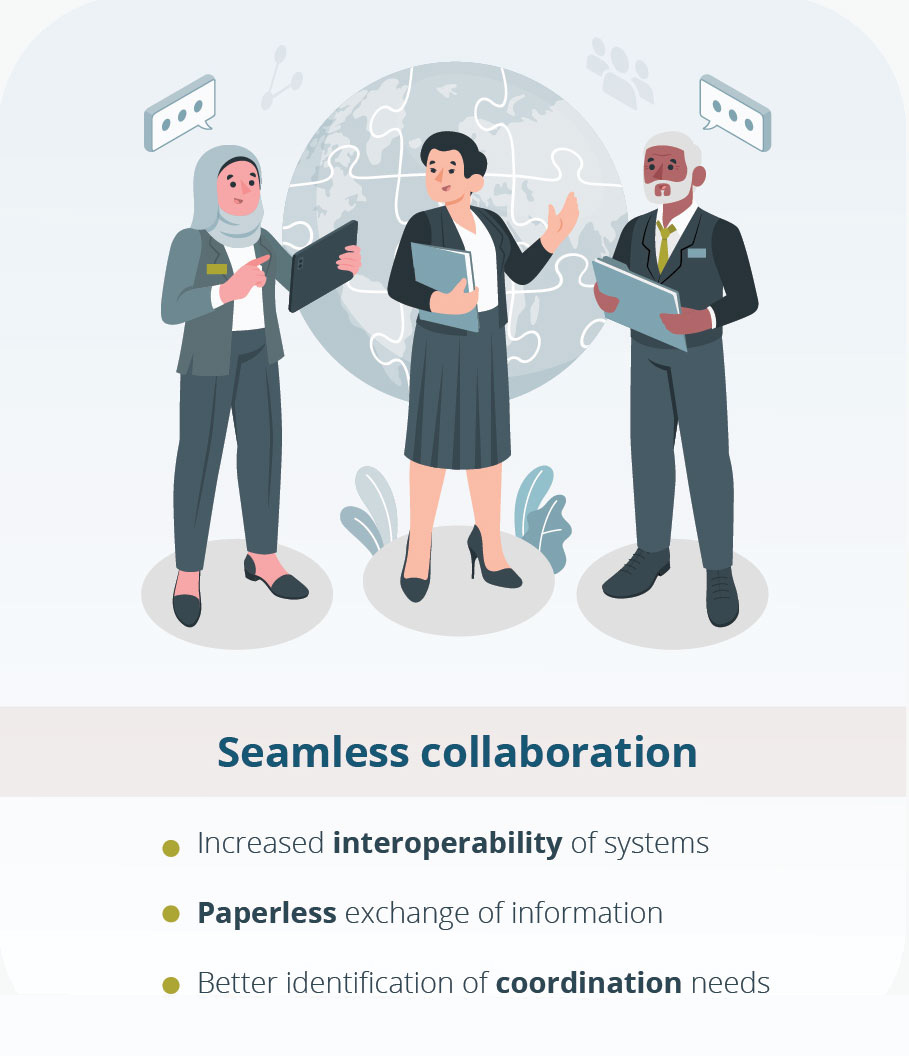Legislative and operational developments requiring the digitalisation of justice
Access to justice and facilitating cooperation between Member States are priorities for the EU to ensure freedom, security and justice. Access to justice needs to be maintained and keep pace with digital developments. This is the impetus behind the 2021 proposal for a Regulation on the digitalisation of judicial cooperation and access to justice in cross-border civil, commercial and criminal matters. It outlines the need to establish a decentralised IT system comprising a network of national IT systems and interoperable access points. These systems should operate under the individual responsibility of each Member State, Union institution, agency or body, enabling secure and reliable cross-border exchange of information.
The latest amendment to the Eurojust Regulation provides for the development of a modernised Eurojust case management system (CMS) and establishes this decentralised IT system as the default channel for communication between Eurojust and the Member States. The amendment also reinforces the digital exchange of information in terrorism cases through the Counter-Terrorism Register (CTR) and simplifies the cooperation with third countries by providing an explicit legal basis for Eurojust’s Liaison Prosecutors to access the CMS.
The Regulation requires the CMS to be connected to a network of IT systems and interoperable e-CODEX access points in the Member States. The Regulation provides for the semi-automated and structured transmission of information from national registers to Eurojust. The Regulation defines access to the CMS at the national level by the national correspondents for Eurojust, the national correspondents for issues relating to the competence of the EPPO and the national correspondents for Eurojust for terrorism matters.
In addition to these legislative developments, Eurojust’s tasks have been evolving rapidly, incorporating new operational functions and resulting in a higher volume of information. Such information includes new types of data processed at Eurojust, for example in relation to the CICED, the hit/no hit cross-matching with partners, the upcoming handling of requests from the European Criminal Records Information System – Third Country Nationals and data from other EU systems.
These operational and legislative developments are the driving forces behind the creation of Eurojust’s Digital Criminal Justice (DCJ) Programme, which entered into force in June 2023.
Eurojust’s Digital Criminal Justice Programme
Eurojust’s DCJ Programme steers the Agency’s implementation of digitalisation requirements and related infrastructure, including the redesign of business processes, new technologies and change management. The vision of the DCJ Programme is to further strengthen operational efficiency and support to Eurojust’s National Desks, facilitated by a modernised CMS and related systems.
The programme’s objectives include:
- enhancing the support of Eurojust’s National Desks to national authorities in the fight against cross-border crime by streamlining operations, sharing information and connecting cases;
- supporting faster and closer collaboration between Eurojust, Member States, partners and third countries;
- enabling Eurojust’s National Desks and administration to adapt to working with the modernised CMS and exploit of its full potential.
Benefits of the Criminal Justice Programme



The programme is governed by representatives from the Agency’s College, National Desks, administration and the European Commission. This enables informed decision-making, effective stakeholder involvement and active communication across the organisation.
The programme will span several years and consist of various projects to deliver a modernised CMS, related IT infrastructure and business processes. It will be implemented in a phased approach, with an operational CMS by the end of 2025 as a first milestone.
Objectives of Eurojust's new Case Management System





The joint investigation team collaboration platform
Another project related to the DCJ Programme is the JIT collaboration platform, currently under development and aimed at improved and more efficient JIT cooperation between countries.
For years, JIT practitioners have been advocating for an online collaborative environment that would enable secure electronic exchange of information and evidence and secure electronic communication with other JIT members and participants.
The Regulation (EU) 2023/969 establishing a collaboration platform to support the functioning of joint investigation teams was adopted on 6 June 2023.
The purpose of the JITs collaboration platform is to facilitate the coordination and management of a JIT; the rapid and secure exchange and temporary storage of operational data (including large files); and secure communications between JIT members and participants. It will also contribute to the traceability of evidence exchange through logging and tracking mechanisms, and it will streamline JIT evaluations by providing for a collaborative evaluation process. Use of the platform will be voluntary.
During 2023, the JITs Network Secretariat, hosted by Eurojust, worked closely with the European Commission and its contractor to draft a business specification study for the implementation of the Regulation.
A working group composed of the European Commission, eu-LISA and the JITs Network Secretariat was set up. The working group met numerous times throughout 2023 and exchanged views on terminology, functionalities and data exchanges from a non-technical point of view, covering all processes that should be implemented in the future platform, including its modules, as well as online tools already managed by the JITs Network Secretariat.
Furthermore, an advisory group was set up, chaired by eu-LISA and composed of representatives from the EU Member States, the European Commission and the JITs Network Secretariat. The JITs Network Secretariat participated in three meetings of the advisory group in 2023, with the aim of preparing the business specification study and better understanding the needs of the collaboration platform’s stakeholders.
During the process, interviews were conducted and a questionnaire was sent to the JIT National Experts and JIT practitioners to gather feedback on their needs and requirements to ensure the platform’s usefulness and suitability. The business specification study was finalised in December 2023. Based on this, eu-LISA will work on implementing the technical aspects of the JITs collaboration platform in 2024, with a view to making it operational by December 2025.
